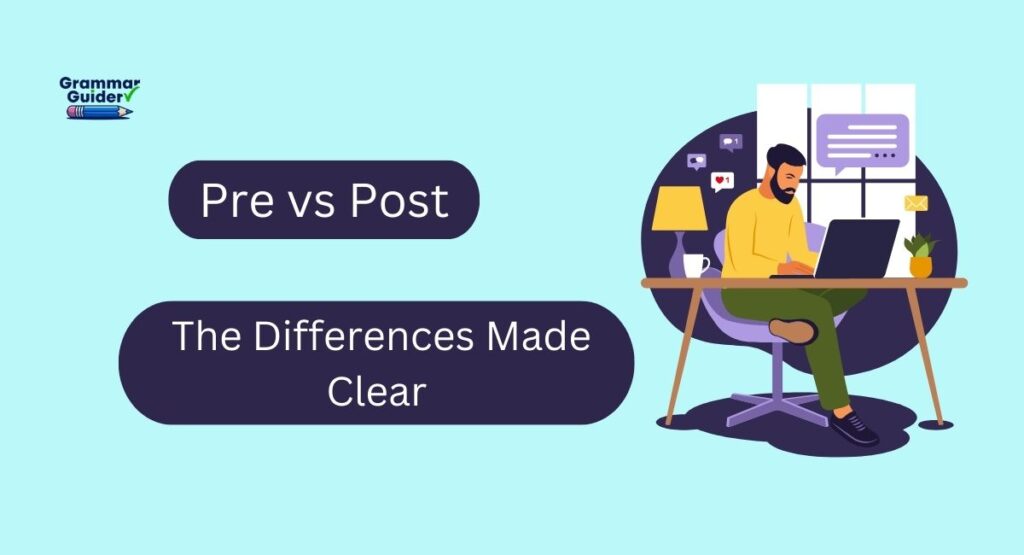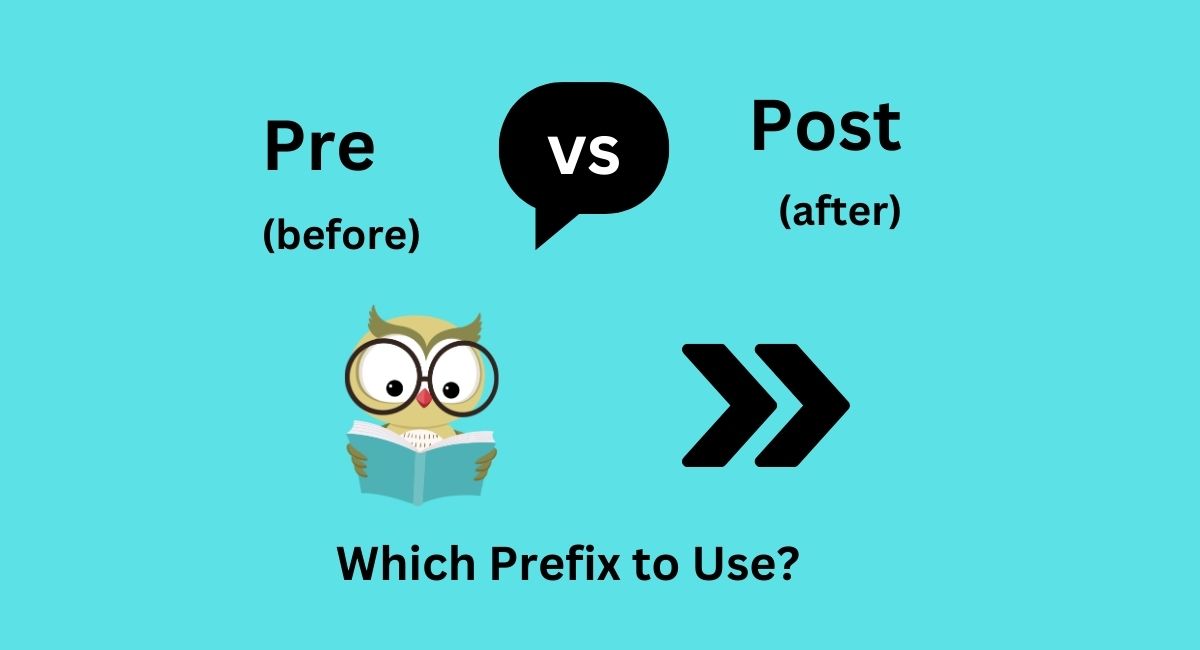The prefixes pre and post help us understand timing in words. Pre means “before” like in “preview” where we see something before it happens. Post means “after” as in “postgame” where things happen after the game ends.
These small prefixes, pre and post make words clearer. Using pre signals what comes before, while post shows what comes later. This helps us understand events, like pre-class warm-ups or post-school activities making time easy to follow.
Pre and Post: Tiny Words Big Impact
The prefixes pre and post may look small but they are powerful. Pre means “before,” so it shows something that happens early. Post means “after” helping us see what comes later, like pre-lunch or post-game.
When we use pre and post, our words become clearer. Pre shows an action that happens first, and post shows what follows. These tiny words help organize time in sentences, making it easy to understand the sequence of events.
Understanding Pre and Post
- Pre means “before” showing something happens first.
- Post means “after” showing something happens later.
- Pre and post help us understand the order of events.
While Handy, Not Quite Antonyms:
The words pre and post are helpful but not true opposites. Pre means “before” while post means “after.” They don’t fully oppose each other like true antonyms do.
These prefixes simply show different points in time. Pre points to the beginning and post points to the end. They help us understand timing without being complete opposites.
Let’s Get Practical
Let’s look at some examples to understand pre and post better. Pre-order a book to get it before release. Post-workout stretches help your muscles after exercise.
You can also see pre and post in school. Pre-school happens before regular school. Post-school activities happen after school is finished.
Pre vs Post: The Differences Made Clear

Pre and post show different times. Pre means before, like pre-test. Post means after like post-dinner. These words help us understand what happens first and what happens last.
Pre sets up something like pre-game. Post looks at the results like post-party cleanup. These words make it easier to organize events.
Timeline:
- Pre signals events that happen before something else. For example pre-game activities happen before the game starts.
- Post shows events that happen after something else. For example post-game celebrations happen after the game ends.
Function:
The function of pre is to help prepare for something. For example pre–test reviews happen before the test. It helps us get ready for what will come next.
The function of post is to reflect after something happens. For example, post-game analysis happens after the game. It shows us what happened and what we can learn from it.
Remember:
Pre means “before” and helps us prepare for something. Post means “after” and shows what happens later. These small words help us understand the order of events clearly.
| Feature | Pre | Post |
|---|---|---|
| Meaning | Refers to something that happens before. | Refers to something that happens after. |
| Function | Prepares for something that is coming. | Reflects on the results or effects after something. |
| Timeline | Marks events or actions that happen before others. | Marks events or actions that occur after others. |
| Grammar | Added at the start of a word. | Added at the start of a word. |
| Examples | Pre-enroll (sign up before the semester). | Post-workout (after exercise). |
| Pre-interview (before an interview). | Post-party (after the party). | |
| Pre-order (before a release). | Post-mortem (after an event). | |
| Analogy | Like a “prologue” (before the main event). | Like an “epilogue” (after the main event). |
| Relationship | Not direct opposites, just different points in time. | Not direct opposites, just different points in time. |
| Sentence Clarity | Focuses on preparing for what is to come. | Focuses on reflecting on what has already happened. |
Origins of ‘Pre’ and ‘Post’
The word pre comes from Latin, meaning “before.” The word post also comes from Latin, meaning “after.” Both prefixes have been used in English for many centuries to show timing.
Pre:
The prefix pre comes from the Latin word “prae” meaning “before.” It was used to show something happening earlier. Over time it passed into Old French and later became part of English.
Post:
The prefix post comes from the Latin word “post” meaning “after.” It was used to describe something that happens later. Like pre it traveled through Old French before entering English and becoming widely used.
Examples in Context
Pre-order a book to get it before the release. Post-game analysis happens after the game to discuss what happened. These examples show when to use pre and post in real situations.
Pre:
- Pre-order a book to get it before it comes out.
- Pre-heat the oven before you bake cookies.
- Pre-school happens before you start regular school.
- Pre-med students take special courses before medical school.
- Pre-game preparations happen before a sports match.
Post:
- Post-workout stretches help your muscles after exercise.
- Post-party cleanup happens after the party ends.
- Post-game analysis happens after the match to discuss what happened.
- Post-surgery care is needed after the operation.
- Post-class discussions happen after the lesson ends.
FAQ’S
What is the prefix pre post?
The prefix pre means “before” and helps show something happens earlier. The prefix post means “after” and shows something happens later.
What is the prefix for pre?
The prefix for pre is pre itself. It means “before” something happens, like in pre-order or pre-heat.
What is the prefix using post?
The prefix postmeans “after.” It shows that something happens after another event or action like post-game analysis after a match.
How to write pre and post?
To write pre and post add them to the beginning of a word. Use pre for something that happens before and post for something that happens after.
How to use post and pre?
Use pre to show something happens before like pre-order. Use post to show something happens after like post-workout. Both words help show the order of events in time.
What is the prefix pre rule?
The pre prefix means “before.” It is used to show something happens earlier like pre-heat (heat before) or pre-order (order before the release).
Final Thoughts
Understanding the difference between pre and post can make your writing clearer. Pre means “before” and it shows things that happen earlier. You can use pre to talk about things like pre-ordering a book or pre-heating an oven. It helps us get ready for what comes next.
On the other hand post means “after.” It tells us about things that happen later like post–workout stretches or post-party cleanups. When we use post we talk about what happens after something else has finished.
Both pre and post are helpful in writing. They guide us through the order of events. By using pre and post correctly, you can make sure your ideas are easy to understand and follow. Keep practicing, and these small prefixes will help you write clearly.

Harley Rose is a seasoned expert in English grammar and writing tips, blending years of knowledge and a love for language into her work. With a sharp eye for detail and a talent for making grammar accessible, Harley shares practical insights that help readers write with precision and flair. Her content is ideal for anyone looking to strengthen their writing skills and express themselves with confidence.

